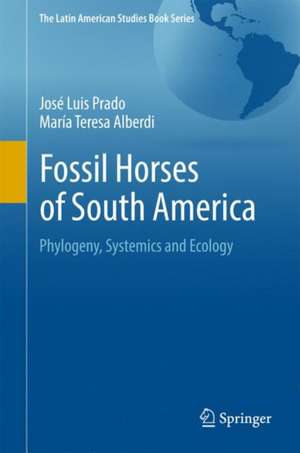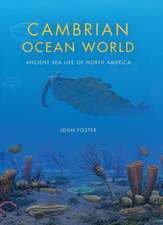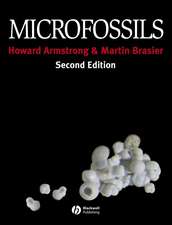Fossil Horses of South America: Phylogeny, Systemics and Ecology: The Latin American Studies Book Series
Autor José Luis Prado, María Teresa Alberdien Limba Engleză Hardback – 4 mai 2017
| Toate formatele și edițiile | Preț | Express |
|---|---|---|
| Paperback (1) | 354.06 lei 38-45 zile | |
| Springer International Publishing – 25 iul 2018 | 354.06 lei 38-45 zile | |
| Hardback (1) | 414.14 lei 3-5 săpt. | |
| Springer International Publishing – 4 mai 2017 | 414.14 lei 3-5 săpt. |
Din seria The Latin American Studies Book Series
- 18%
 Preț: 726.85 lei
Preț: 726.85 lei - 18%
 Preț: 793.14 lei
Preț: 793.14 lei -
 Preț: 392.97 lei
Preț: 392.97 lei - 20%
 Preț: 589.20 lei
Preț: 589.20 lei - 18%
 Preț: 891.02 lei
Preț: 891.02 lei -
 Preț: 396.02 lei
Preț: 396.02 lei - 15%
 Preț: 647.40 lei
Preț: 647.40 lei - 18%
 Preț: 1018.37 lei
Preț: 1018.37 lei - 18%
 Preț: 897.65 lei
Preț: 897.65 lei - 15%
 Preț: 526.50 lei
Preț: 526.50 lei - 18%
 Preț: 748.46 lei
Preț: 748.46 lei - 18%
 Preț: 943.43 lei
Preț: 943.43 lei - 18%
 Preț: 1008.12 lei
Preț: 1008.12 lei - 15%
 Preț: 653.14 lei
Preț: 653.14 lei - 5%
 Preț: 847.00 lei
Preț: 847.00 lei - 15%
 Preț: 520.77 lei
Preț: 520.77 lei - 24%
 Preț: 795.90 lei
Preț: 795.90 lei - 20%
 Preț: 574.08 lei
Preț: 574.08 lei - 20%
 Preț: 560.93 lei
Preț: 560.93 lei - 24%
 Preț: 906.18 lei
Preț: 906.18 lei - 18%
 Preț: 940.39 lei
Preț: 940.39 lei - 24%
 Preț: 783.99 lei
Preț: 783.99 lei - 15%
 Preț: 470.88 lei
Preț: 470.88 lei - 24%
 Preț: 590.40 lei
Preț: 590.40 lei - 18%
 Preț: 890.23 lei
Preț: 890.23 lei - 20%
 Preț: 581.64 lei
Preț: 581.64 lei - 20%
 Preț: 566.19 lei
Preț: 566.19 lei - 15%
 Preț: 635.47 lei
Preț: 635.47 lei - 24%
 Preț: 648.81 lei
Preț: 648.81 lei -
 Preț: 368.39 lei
Preț: 368.39 lei - 20%
 Preț: 574.08 lei
Preț: 574.08 lei - 15%
 Preț: 586.88 lei
Preț: 586.88 lei - 24%
 Preț: 794.72 lei
Preț: 794.72 lei - 24%
 Preț: 633.43 lei
Preț: 633.43 lei
Preț: 414.14 lei
Nou
Puncte Express: 621
Preț estimativ în valută:
79.24€ • 82.74$ • 65.59£
79.24€ • 82.74$ • 65.59£
Carte disponibilă
Livrare economică 14-28 martie
Preluare comenzi: 021 569.72.76
Specificații
ISBN-13: 9783319558769
ISBN-10: 3319558765
Pagini: 150
Ilustrații: X, 150 p. 44 illus., 23 illus. in color.
Dimensiuni: 155 x 235 mm
Greutate: 1.03 kg
Ediția:1st ed. 2017
Editura: Springer International Publishing
Colecția Springer
Seria The Latin American Studies Book Series
Locul publicării:Cham, Switzerland
ISBN-10: 3319558765
Pagini: 150
Ilustrații: X, 150 p. 44 illus., 23 illus. in color.
Dimensiuni: 155 x 235 mm
Greutate: 1.03 kg
Ediția:1st ed. 2017
Editura: Springer International Publishing
Colecția Springer
Seria The Latin American Studies Book Series
Locul publicării:Cham, Switzerland
Cuprins
Introduction.- Taxonomy nomenclature.- Collections around the word.- Systematic and phylogeny.- Iostratigraphy and biogeography.- Ancient feeding ecology and niche differentiation of Pleistocene horses.- Horses and megafauna extinction.
Notă biografică
Professor Prado is internationally known for his contributions to the study of fossil horses and paleobiology in South America. He has published over 140 articles in leading international journals, including Nature, Science, PNAS, BMC ecology and Evolutionary Ecology. Prof. Prado. He has also extensive experience managing large research grants. He is frequently invited to present his research at international conferences. His research has made substantial contributions to our understanding of horse evolution, particularly in relation to diversification and extinction processes.
Dr. Alberdi is an internationally respected paleontologist who has extensive experience in South America. She currently works at the National Museum of Natural Sciences (CSIC) in Spain, where she was a Vice-Director and also head of the Paleontology department. She is active at the Natural Resources Scientific Committee and is a reviewer for a number of leading paleontology and vertebrates journals.
Dr. Alberdi is an internationally respected paleontologist who has extensive experience in South America. She currently works at the National Museum of Natural Sciences (CSIC) in Spain, where she was a Vice-Director and also head of the Paleontology department. She is active at the Natural Resources Scientific Committee and is a reviewer for a number of leading paleontology and vertebrates journals.
Textul de pe ultima copertă
This book provides an update on the phylogeny, systematics and ecology of horses in South America based on data provided over the past three decades. The contemporary South American mammalian communities were shaped by the emergence of the Isthmus of Panama and by the profound climatic oscillations during the Pleistocene. Horses were a conspicuous group of immigrant mammals from North America that arrived in South America during the Pleistocene. This group is represented by 2 genera, Hippidion and Equus, which include small species (Hippidion devillei, H. saldiasi, E. andium and E. insulatus) and large forms (Equus neogeus and H. principale). Both groups arrived in South America via 2 different routes. One model designed to explain this migration indicates that the small forms used the Andes corridor, while larger horses used the eastern route and arrived through some coastal areas. Molecular dating (ancient DNA) suggests that the South American horses separated from the North Americantaxa (caballines and the New World stilt-legged horse) after 3.6 - 3.2 Ma, consistent with the final formation of the Panamanian Isthmus. Recent studies of stable isotopes in these horses indicate an extensive range of 13C values cover closed woodlands to C4 grasslands. This plasticity agrees with the hypothesis that generalist species and open biome specialist species from North America indicate a positive migration through South America.
Caracteristici
Is a fascinating book about the development and extinction of horses in America Written by two very prestigious mammal paleontologists Researches the origins of horses in America and their extinction in Late Glacial times Includes supplementary material: sn.pub/extras







